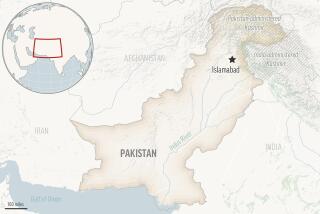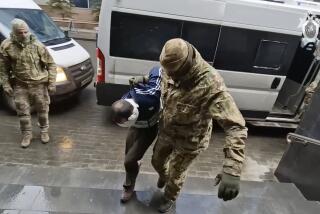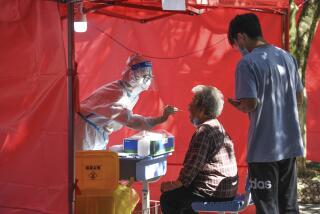Uighur violence in China leaves at least 19 dead
- Share via
Reporting from Beijing — At least 19 people were killed over the weekend in the far-western city of Kashgar in attacks that China blamed on members of the local Uighur minority who had been training at Islamic camps across the border in Pakistan.
Chinese and Uighur sources presented different versions of events, neither of which could be independently verified.
In the first attack just before midnight Saturday, the perpetrators hijacked a truck that had been stopped at a red light, killed the driver, then used the truck to plow into a crowd of bystanders, Chinese media said. The hijackers were reported to have jumped out of the truck, wielding knives and stabbing at random. Eight people were reported to have been killed, including the driver.
Then, on Sunday afternoon, a bomb exploded at a downtown restaurant, apparently set off as a decoy.
“When police officers and firefighters rushed to the scene, a group of five suspects rushed out and started to stab civilians,” the website of Kashgar’s local government reported Monday.
The local government said six civilians were killed, along with five suspects, one of whom was reported to have confessed before his death.
“According to the confession of one of the suspects, this group’s leader sneaked across the border into Pakistan and received training of making guns and explosives from the Eastern Turkistan Islamic Movement,” the local government said. “Its members all have extreme religious beliefs and are determined to continue the ‘holy war.’ They made explosives and planned to carry out violent terrorist attacks.”
East Turkistan is the name many Uighurs use to refer to the Xinjiang region. Chinese authorities have long insisted that periodic attacks in Xinjiang are coordinated by this shadowy group called the Eastern Turkistan Islamic Movement, while Uighurs — and some human rights advocates — say the violence is more random and spontaneous, with most of the weapons homemade.
Dilxat Raxit, a spokesman for the World Uyghur Congress, disputed China’s account. He said the conflict started with a brawl between local Uighurs and municipal police and that most of the dead were police officers. “The underlying cause of this incident is the current repressive Chinese rule,” said Raxit in a phone interview from Sweden, where he lives in exile.
Kashgar is one of the most volatile cities in China, a former Silk Road oasis less than 200 miles from the borders with Afghanistan and Pakistan that has been designated by the government as a special economic zone along the lines of Shenzhen.
Uighurs, a Turkic minority who once dominated here, resent the influx of Han Chinese migrant workers and investors. Many jobs are reserved for the Han only. Kashgar’s ancient walled city, once a cultural icon for the Uighurs, has been largely demolished by Chinese authorities to make way for modern concrete apartments.
Uighurs “do not have any way to protest peacefully, and in a desperate attempt to protest, they started a fight with the police,” Raxit said.
He predicted that conflicts would escalate in the coming days with the approach of Ramadan, observed by many Uighurs despite restrictions on religious practice by the Communist Party.
The Kashgar conflict follows close on the heels of an incident last month in Hotan, another Xinjiang city, in which 20 people were killed after Uighurs attacked a police station with homemade explosives and knives. That incident grew out a crackdown by the Chinese on the wearing of Islamic face veils.
“It speaks to the general discontent that simmers in this region. Any small incident quickly overheats and boils into something much larger,” said Dru Gladney, an expert on Xinjiang at Pomona College.
Kashgar on Sunday was under a curfew, according to residents. At the Chinese-run Yulong Hotel, a receptionist who gave her family name as Ye said that people expected business to be back to usual by Monday.
“I’m not really scared. It’s not like they can get into the hotel and attack me,” said Ye.
More to Read
Sign up for Essential California
The most important California stories and recommendations in your inbox every morning.
You may occasionally receive promotional content from the Los Angeles Times.










